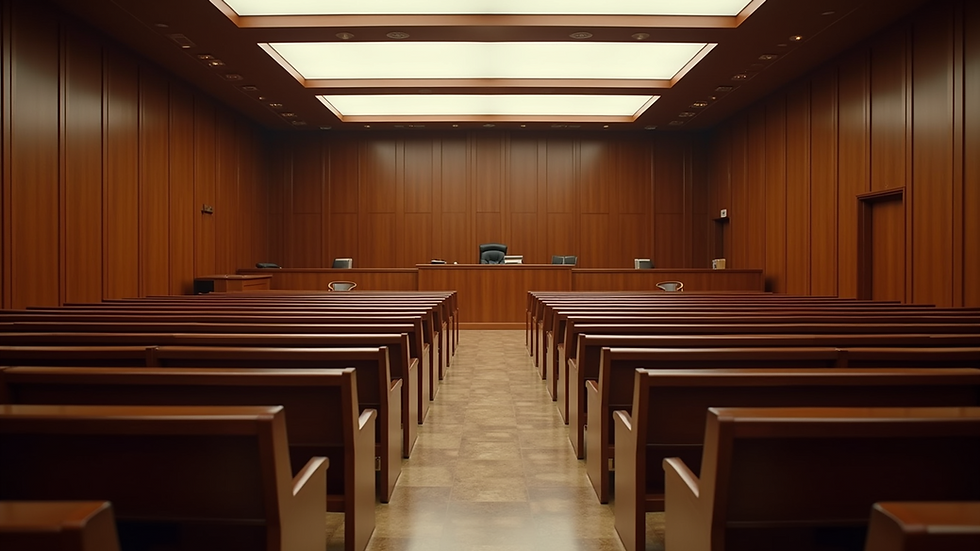Understanding the Fifth Amendment: Key Insights
- Angel Harrelson

- Oct 7, 2025
- 4 min read
The rights guaranteed by the fifth amendment are fundamental to protecting individuals from government overreach. This constitutional safeguard plays a crucial role in ensuring fairness and justice within the legal system. Understanding its history, applications, and consequences when violated is essential for anyone interested in preserving liberty and supporting those who stand for constitutional rights.
The Origins and Fifth Amendment History
The roots of the fifth amendment trace back to the English legal tradition, particularly the Magna Carta of 1215, which established early protections against arbitrary imprisonment and self-incrimination. When the United States Constitution was drafted, the framers included the fifth amendment as part of the Bill of Rights in 1791 to protect citizens from abuses by the government.
The amendment addresses several key protections:
Protection against self-incrimination, meaning no one can be forced to testify against themselves.
Protection against double jeopardy, preventing a person from being tried twice for the same crime.
The right to due process, ensuring fair treatment through the judicial system.
Protection against the government taking private property without just compensation.
These protections were designed to limit government power and uphold individual freedoms, reflecting the founders' commitment to justice and liberty.

How the Fifth Amendment Protects You Today
In modern times, the fifth amendment remains a powerful tool for protecting individual rights. It is often invoked in criminal cases when a defendant chooses to "plead the fifth" to avoid self-incrimination. This means a person can refuse to answer questions or provide information that could be used against them in court.
For example, during police interrogations, suspects have the right to remain silent. This prevents law enforcement from coercing confessions or forcing individuals to admit guilt without proper evidence. Additionally, the amendment ensures that no one can be tried twice for the same offense, which protects against government harassment.
The due process clause guarantees that legal proceedings must be fair and follow established rules. This includes the right to a fair trial, notice of charges, and an opportunity to defend oneself. The protection against eminent domain abuse means the government cannot seize private property without paying a fair price.
These safeguards are essential for maintaining trust in the justice system and preventing government overreach.

What happens if the 5th is violated?
Violations of the fifth amendment can have serious consequences for both individuals and the justice system. When these rights are ignored or trampled, it undermines the rule of law and can lead to wrongful convictions or government abuse.
If a person's right against self-incrimination is violated, any evidence obtained through forced testimony may be excluded from trial. This is known as the exclusionary rule, which helps deter illegal interrogation tactics. Similarly, if someone is tried twice for the same crime, the second trial can be dismissed as unconstitutional.
Due process violations can result in overturned convictions or retrials. Courts take these breaches seriously because they strike at the heart of fairness in the legal system. When the government seizes property without just compensation, property owners can sue for damages or demand fair payment.
For those who support constitutional rights and the rule of law, it is critical to recognize and challenge any infringement on these protections. Standing up for the fifth amendment helps ensure justice for all, including those who have been unfairly targeted or prosecuted.

Practical Tips for Protecting Your Rights
Understanding your rights under the fifth amendment is the first step toward protecting yourself. Here are some practical recommendations:
Know when to remain silent - If you are questioned by law enforcement, politely assert your right to remain silent until you have legal representation.
Request an attorney - Always ask for a lawyer before answering any questions to ensure your rights are protected.
Document any violations - If you believe your rights have been violated, keep detailed records and seek legal advice immediately.
Educate others - Share knowledge about the fifth amendment with family and friends to promote awareness and protection of constitutional rights.
Support organizations defending constitutional freedoms - Engage with groups that advocate for justice and the rule of law.
By taking these steps, you can help safeguard your rights and contribute to a society that respects individual liberties.
The Fifth Amendment’s Role in Supporting Justice and Liberty
The fifth amendment is more than just legal jargon - it is a cornerstone of American freedom. It protects individuals from government tyranny and ensures that justice is administered fairly. For those who value the principles of liberty and the rule of law, understanding and defending this amendment is vital.
Supporting those who have faced legal challenges for standing up for their rights, such as the J6ers, means advocating for the protections guaranteed by the constitution. Upholding the fifth amendment helps maintain a system where every citizen is treated with fairness and dignity.
By staying informed and vigilant, we can continue to support our country and the freedoms that make it great.

This overview of the fifth amendment history and its ongoing importance highlights why it remains a critical safeguard for justice. Knowing your rights and standing firm in their defense is essential for preserving the freedoms that define the United States.
.png)




Comments